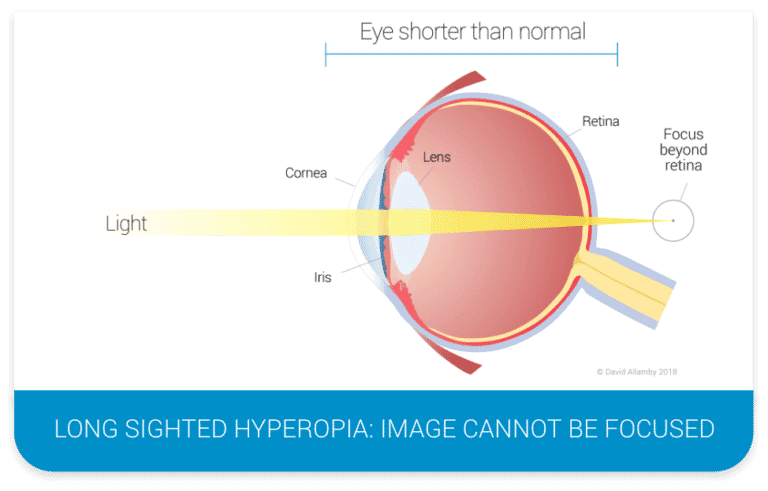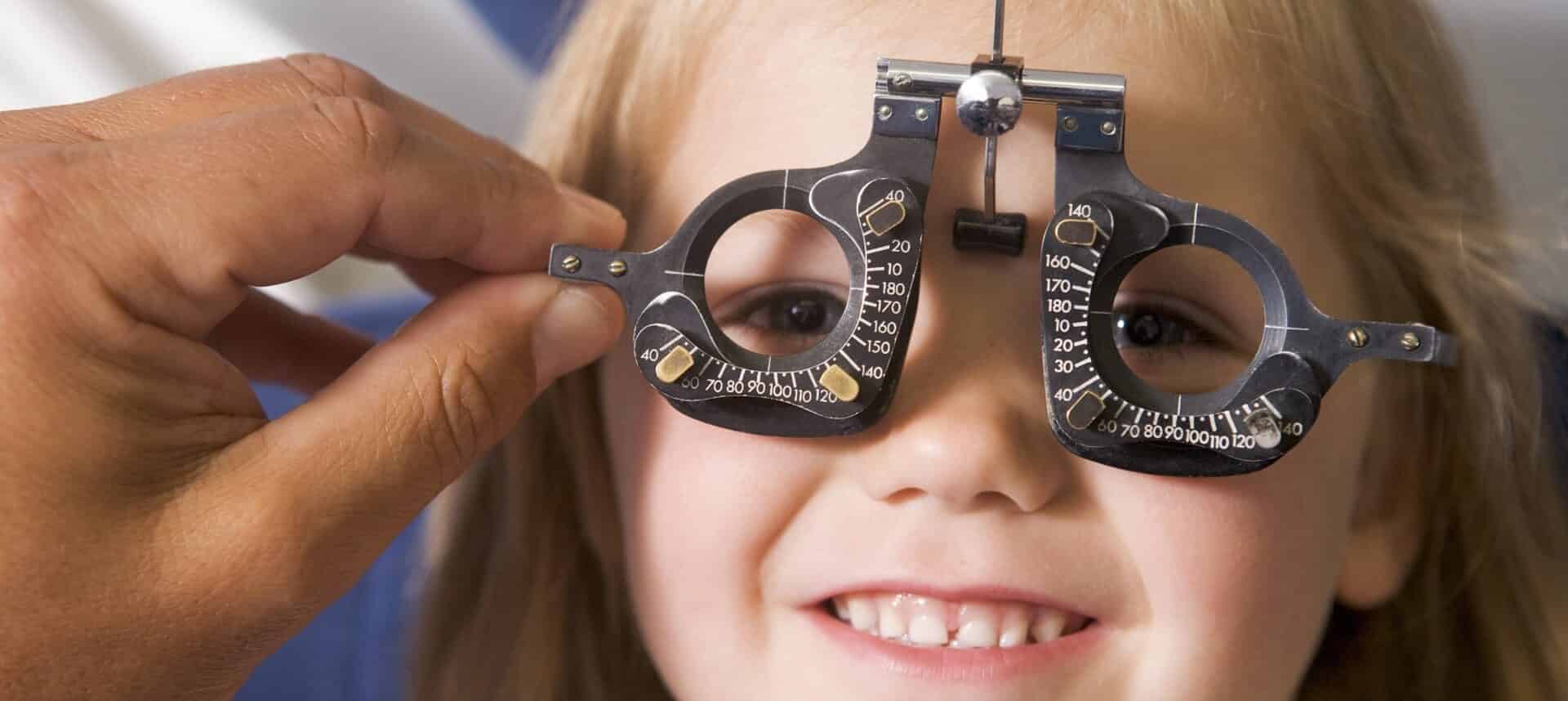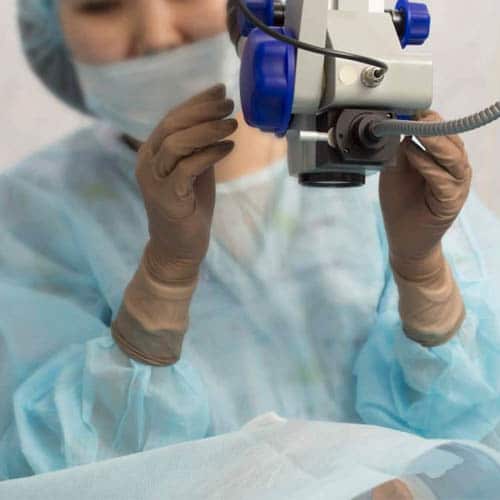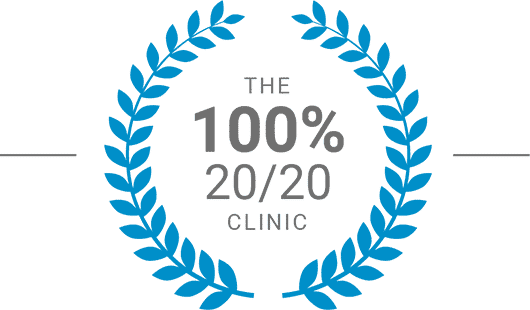Book Your Free Consultation
Mr David Allamby
MD, FRCOphth, FRCS
Hyperopia (far- or long-sightedness) is a common refractive error where distance vision may not necessarily be affected, but objects closer to the subject are poorly defined and blurry. However, it is worth noting that everyone will experience hyperopia differently.
There are many people with hyperopia who may not exhibit any problems with their vision, especially during their early years. But if the refractive error caused by hyperopia becomes substantial enough vision may be affected over a range of distances.

Refraction occurs when light is bent as it passes through an object, such as a drinking glass, prism or the lens of your eye. When light is refracted through the cornea and lens of the eye, it becomes focused on the retina.
Your retina will then process this light information relaying it via the optic nerve to the brain. Vision occurs when the brain receives this information and interprets it as an image.
When there is a refractive error present; an abnormality in the shape of the eye, or part of the eye, is preventing light from being focused correctly on the retina. These refractive errors can cause short- and long-sightedness with each presenting with different but similar symptoms.
Patients with hyperopia can often display different symptoms, but the most common symptoms of hyperopia include:
In an eye displaying no abnormalities in shape, the light will be focused onto the retina through the cornea and the lens producing a clear image. Hyperopia occurs when the cornea has too small a curve, or if the eye is too short from front to back, causing a refractive error where the image is focused beyond the retina.

It is possible for adults with hyperopia to have difficulty at all ranges of vision, there are also numerous effects this may have on a patient’s lifestyle:
If hyperopia remains uncorrected, you may find it difficult or impossible to perform some daily tasks as efficiently as you would like. With limited levels of vision also disparaging many people from participating in activities that they enjoy.
Uncorrected long-sightedness may cause you to squint excessively whilst concentrating to maintain focus, this can lead to regular headaches and eye-strain.
Throughout a lifetime, the cost of corrective measures can add up. With the cost of routine eye exams, contact lenses, solutions and eyeglasses all becoming a significant financial burden.
The safety of not only yourself but of others may be at risk if you are driving or operating machinery with an uncorrected refraction error.
Children with hyperopia are at a higher risk of developing crossed eyes, as they overcompensate to correct the vision error. Eyeglasses explicitly designed for children with long-sightedness may be enough to treat this issue.
It is always best practice to keep regularly scheduled eye examinations, so any issues you may currently have can be monitored, and new developments can be caught in their early stages.
However, if you feel that you are exhibiting several of these symptoms or any previously diagnosed hyperopia has become increasingly worse. You should schedule an eye examination to diagnose any condition or address the level of corrective treatment required.
Far-sightedness can be diagnosed during a routine eye examination. To make the correct diagnosis your eye specialist will do a series of tests, this only takes a short amount of time and is entirely pain-free.
The tests that you can expect to undergo:

This test is designed to measure how clearly you can see. You will be asked to identify and read aloud letters printed on a chart (Snellen chart) where the font gets progressively smaller from top to bottom.
This will be done covering one eye, and then the other. Near vision may also be tested using a handheld version of this chart.
If the visual acuity test shows that you have a refractive error causing long-sightedness, your eye doctor will perform a retinal exam to confirm what is causing the error.
During a retinal exam, your doctor will use a retinoscope to review the back of the eye, including the retina and optic disk. Usually, eye drops will be used to keep the pupils dilated, making it easier for your doctor to see the structures of the eye.
You may have a direct exam, where the retinoscope is used to shine a focused beam of light through your pupil to view the back of the eye. Or an indirect exam where the eye is examined with the aid of a condensing lens, allowing the eye to be examined in great detail.
Your doctor may decide to perform both direct and indirect examinations.
When you have been diagnosed with a refractive error your doctor will need to assess the severity of the dysfunction so that the correct prescription can be made.
A computerized refractor may be used to estimate the required prescription, but a lot of the time this assessment will be done using a phoropter.
A phoropter is a mask-like piece of equipment, that houses wheels with lenses of varying strengths. When you are looking through the phoropter, different combinations of lenses will be applied, and you will be asked to verbally confirm which combinations provide the best vision correction.
By doing this, your doctor can prescribe the appropriate level of prescription to correct any refractive error you may have.
Once a diagnosis has been made, and your doctor has determined your prescription level, they will open up discussions regarding the potential treatment options to manage long-sightedness.
There are a number of treatment options available for those with hyperopia, both surgical and non-surgical and can include:

A prevalent choice for treating the symptoms of hyperopia, regular check-ups will be required to update any changes in your prescription that may occur over time. This can build up a considerable financial cost over a person’s lifetime, especially if your prescription changes regularly.
Many people will opt for contact lenses over glasses for various personal and practical reasons, although the effect of treatment remains the same.
Eyeglasses are worn on the face, whereas contact lenses are applied directly on the eye. A distinct advantage of contact lenses over eyeglasses is that patients will experience a much-improved field of view but with an increased risk of eye infections and vision complications.
Again, there can be a significant cost associated over time with lenses, solution and costs of regular eye examinations all coming into play.
Laser-assisted refractive surgery has seen a sharp rise in popularity over recent years, offering several advantages when compared to more traditional treatments. With prices starting at £4,400 for laser refractive surgery on both eyes.
This price is far lower than the estimated cost of glasses and contact lenses throughout a person’s lifetime. Advancements in technology have also resulted in fantastic post-operative results and high levels of safety for anyone considering laser-assisted surgery as an option.
However, refractive surgery will only be considered once any present refractive error has stabilised. Refractive errors can be expected to stabilise throughout a person’s 20’s.
The most common laser refractive surgeries are:
Before you can be determined as a suitable candidate for LASIK you will undergo a thorough consultation and screening process to allow for the greatest level of success.
During LASIK a femtosecond laser is used to create a flap in the cornea of the eye, exposing the tissue underneath. Once the corneal tissue is revealed, a second excimer laser is used to remove tissue from the cornea, reshaping it to allow the eye to focus light correctly.
The corneal flap will then be placed back in position to begin the healing process. LASIK’s main limiting factor is how much tissue is available to be removed in the reshaping process.
RK may be an option for patients who are determined to be unsuitable for LASIK surgery. The procedure is very similar to LASIK in that an excimer laser is used to reshape the cornea.
The key difference, however, is that rather than creating a corneal flap, a thin outer layer of the cornea (epithelium) is removed before reshaping begins. This does result in a slightly longer initial healing time for PRK as the surface cells replenish themselves.
Overall, the end result between LASIK and PRK show comparable levels of success, and the decision of which procedure will be most suited is mostly down to personal anatomy.
Some patients may be more suited to a surgical lens exchange option. These surgeries are similar to cataract surgery, although the eyes natural lens won’t necessarily be showing any signs of whitening.
Intraocular lens implants (IOLS) will be used to replace the eyes natural lens, which is removed first. There are artificial lenses that can be placed over the natural lens of the eye; these are known as phakic intraocular lens implants.
All available options will make corrections to the refractive error within the patient’s eye. However, there is no guarantee that you may never require glasses again.
If you are currently considering a surgical option to treat any hyperopia you may be experiencing, Focus Clinic offers a free initial consultation.
At Focus Clinic London our surgeons have a combined 45 years’ experience, having performed more than 35,000 procedures between them. Not only that but they are some of the UK’s only ophthalmologists working in laser refractive surgery (laser eye surgery) full time.
Focus Clinic also holds the #1 spot on Trustpilot for eye treatment-related clinics.
With a 100% success rate of 20/20 vision or better in cases of myopia, thanks to a thorough consultation and screening service alongside our level of experience and expertise.
When choosing Focus Clinic, you can rest easy knowing you will be cared for by some of the UK’s finest refractive surgery specialists.
References:
Book a FREE* Consultation
To get a better idea of how we can help you, and also the different types of services we offer, book a consultation now.

100% 20/20 vision
Focus Clinic has a remarkable 100% success rate for 20/20 vision. We know of no other clinic that has matched these results. There is a big difference between, for example, 98% and 100% success, especially if you are in the 2%.

10 year guarantee
Your 10 Year Guarantee means you can return at any time if you have additional questions on the quality of your vision. If you have distance vision correction for short-sight then any repeat laser eye treatments to correct a return of myopia in the first 10 years are included free of charge.*

Most trusted eye treatment clinic
We have the highest trust rating of any ‘eye treatment’ rated clinic, according to independent review site TrustPilot. With an outstanding 9.9 out of 10, when it comes to your eyes, choose the clinic that actual patients trust the most.
*Terms and conditions apply, excludes any age-related changes and conditions unrelated to the primary treatment